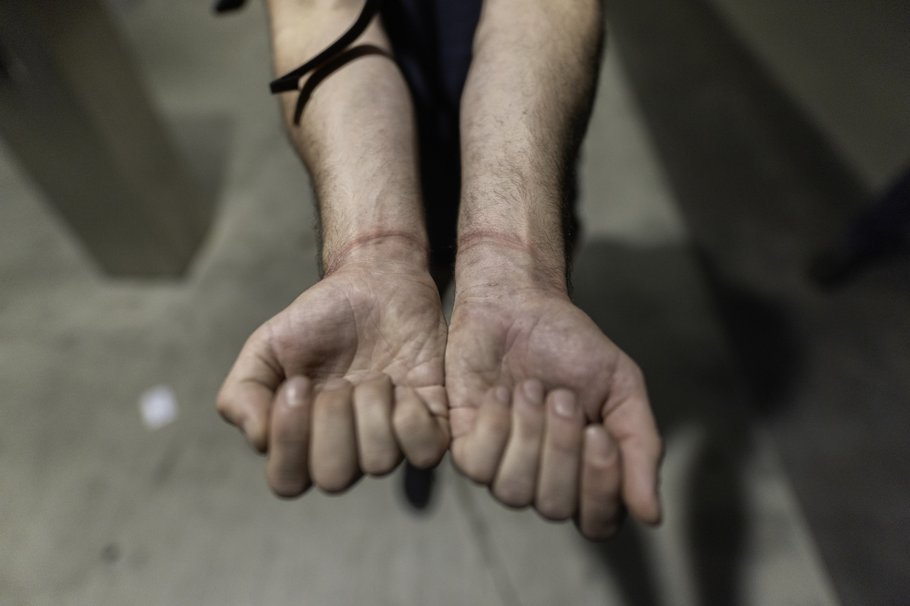Incident details
- Date of incident
- August 8, 2025
- Location
- Los Angeles, California
- Targets
- Nate Gowdy (Independent)
- Arrest status
- Detained and released without being processed
- Arresting authority
- Los Angeles Police Department
- Unnecessary use of force?
- Yes
Arrest/Criminal Charge
- Assailant
- Law enforcement
- Was the journalist targeted?
- Yes
Assault
- Equipment damaged
- Actor
- Law enforcement
Equipment Damage

Photographer Nate Gowdy’s wrists after he was released from his zip-tie restraints. Gowdy and other journalists were detained by Los Angeles Police Department officers while covering a protest in LA on Aug. 8, 2025.
Independent photojournalist Nate Gowdy was assaulted and detained by police while documenting a protest against immigration raids in downtown Los Angeles, California, on Aug. 8, 2025.
Protests in LA began in early June in response to federal raids of workplaces and areas in and around the city where immigrant day laborers gather, amid the Trump administration’s larger immigration crackdown. Raids at Home Depots in early August took place seemingly in defiance of a July 11 court order temporarily prohibiting federal agents from using discriminatory profiling.
On Aug. 8, two days after an immigration raid in the parking lot of a Home Depot in LA’s Westlake neighborhood, protesters gathered at the store and marched to the Metropolitan Detention Center downtown. The demonstrators and the journalists covering them encountered a violent response from Los Angeles Police Department officers, violating a court order protecting the press from arrest, assault or other interference.
Gowdy, who was visiting from Seattle, Washington, said he had been photographing the Aug. 8 protest with his partner, fellow journalist Carrie Schreck. The two began documenting the demonstration as protesters started to march. The protest remained peaceful, Gowdy said, until the LAPD arrived.
“They basically lined up and without any provocation, in order to move people, started just swinging their batons indiscriminately,” he told the U.S. Press Freedom Tracker.
Gowdy watched as one journalist, Nick Stern, waving his press badge to officers, was struck in the face with a police baton. Gowdy himself was thrown to the ground by several officers, scraping his elbow and damaging the metal connectors on the strap holding his spare camera lenses.
“They were so aggressive and wild-eyed and violent,” he said of the LAPD.
After police declared the protest an unlawful assembly, officers pushed demonstrators farther from the detention center. Gowdy and Schreck had stopped photographing and were leaving the area when they were suddenly kettled, or herded by police, along with a handful of journalists and demonstrators, just three blocks from Schreck’s apartment.
Some had press credentials, but Gowdy said officers ignored them.
“They said they didn’t care, and that everyone should have to line up against the wall,” Gowdy recalled.
The journalists’ hands were placed in zip-tie restraints. While some were released, Gowdy and Schreck remained detained for not having physical press badges. Despite carrying camera gear and being vouched for by their colleagues, the officers questioned their legitimacy and denied their requests to speak with a public information officer.
Gowdy offered to show digital credentials and suggested a quick online search to verify his work with major news outlets, but was told he’d be cited for failure to disperse. He and Schreck were taken to a nearby police station and eventually released after more than two hours in custody.
Gowdy said such traumatic encounters can discourage journalists from covering protests.
“In this case, the law was on our side,” he said. “But they didn’t seem to know the law, or they willfully disregarded it in order to intimidate and harass us.”
Gowdy said he doesn’t wear a press badge when he covers protests in Seattle, after it made him a police target. Covering the Jan. 6 Capitol insurrection, he saw how press credentials can also attract threats from demonstrators. Still, he said this incident convinced him to carry one just in case.
The LAPD did not respond to a Tracker request for comment about the detained journalists. In a statement posted to the social platform X, the department’s Central Division wrote that an unlawful assembly was declared “due to the aggressive nature of a few demonstrators.”
“The protest went into the late night hours with people refusing to disperse,” it continued. “Central Division will continue to support 1st Amendment rights of all people. However, if violence or criminal activity occurs, laws will be enforced.”
The Los Angeles Press Club filed a motion Aug. 13 to hold the city of Los Angeles in contempt for violating the temporary restraining order in place to protect journalists while they’re covering protests, citing the Aug. 8 detentions of Gowdy and others, as well as the assaults of multiple members of the press.
“Defendants’ actions evince a blatant disregard for the First Amendment and an unwillingness or an inability or both on the part of the City to take steps necessary to ensure compliance with this Court’s Injunction,” the motion read. “What will it take to get the LAPD to respect the constitutional rights of journalists?”
Editor's Note: This article was updated Aug. 14, 2025, to include details of the contempt motion filed by the LA Press Club and Status Coup.
The U.S. Press Freedom Tracker catalogs press freedom violations in the United States. Email tips to [email protected].